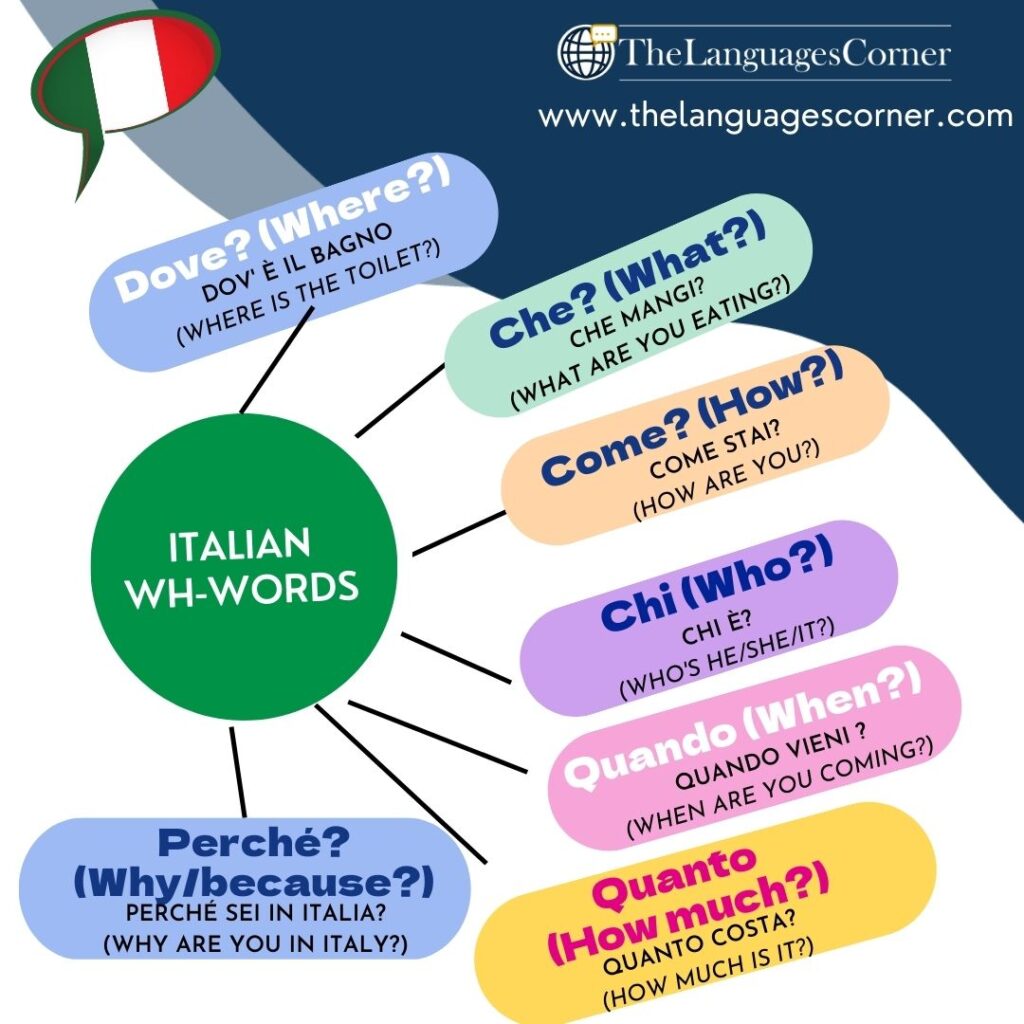Unlock the secrets to enhance your Italian conversation skills with our “kit”!
Have you ever experienced that moment of speechlessness or shyness when trying to converse in Italian, particularly with new acquaintances? Perhaps, after the conversation ends, you’re left with a flood of thoughts, regretting missed opportunities to express yourself more effectively.
Rest assured, this is a common occurrence, especially when engaging in conversations in a foreign language, where not all words, sentences, or structures may readily come to mind. That’s precisely why it’s beneficial to equip yourself with a handy “conversation kit” to facilitate communication and elevate your Italian speaking abilities.
Within this comprehensive guide, you’ll discover an array of conversation starters, suitable responses to specific inquiries, helpful filler words and phrases, as well as a wealth of additional resources tailored to enhance your proficiency in Italian conversation. Say goodbye to those moments of uncertainty and elevate your language skills to new heights!

1. Craft Your Personalized Conversation Cheat Sheet
- What’s a Cheat Sheet? A personalized conversation cheat sheet is a curated collection of Italian words, phrases, and expressions tailored to your interests and personality. Making one will empower you to feel confident and prepared in social situations, as well as able to navigate different conversations. While introducing yourself serves as effective conversation starter in Italian, it can only take you so far. To foster meaningful relationships and cultivate friendships, it’s crucial to be equipped with the ability to ask and answer questions across various topics.
- How do I make one? Begin creating your personalized conversation sheet by crafting a concise depiction of your identity and interests. Share a glimpse of your recent experiences, aspirations, and preferences to provide a captivating introduction that sparks engaging conversations. Don’t forget to highlight any unique events or hobbies that can serve as excellent conversation starters, capturing the attention of your interlocutors. This is an example:

Ciao, mi chiamo Sarah, sono americana e ho 28 anni. Vivo in Italia da due anni perché mio marito lavora alla base. Prima di venire in Italia, ho viaggiato molto. Mi piace leggere, cucinare e fare sport.
Hello, my name is Sarah. I’m American and I’m 28 years old. I’ve been living in Italy for two years because my husband works at the base here. Before coming to Italy, I traveled a lot. I enjoy reading, cooking, and playing sports.
Then, you can expand on each aspect and envision your responses to specific inquiries by putting together a collection of phrases and vocabulary precisely customized to suit your requirements. For example:
Group 1
Places
- Vivo in Italia da… (“I’ve been living in Italy for …)
- È la prima volta che vengo a Roma. (“It is my first time in Rome.”)
- Mi piace molto viaggiare. (“I really like travelling.”)
Group 2
Activities
- Vado spesso al cinema. (“I often go to the movies”)
- La mia attrice preferita è …. (“My favorite actress is….”)
- I miei hobby sono…. (“My hobbies are….”)
Group 3
Hobbies
- Studio piano da quando ero piccolo/a. (“I study piano since I was a child.”)
- Ho comprato un pianoforte. (“I bought a piano.”)
- Adoro la musica. (“I adore music.”)
REGULAR VERBS FROM THE ABOVE EXAMPLES
| VIVERE (TO LIVE) | STUDIARE (TO STUDY) | ADORARE (TO ADORE/LOVE) |
| Io vivo | Io studio | Io adoro |
| Tu vivi | Tu studi | Tu adori |
| Lui/lei/Lei vive | Lui/lei/Lei studia | Lui/lei/Lei adora |
| Noi viviamo | Noi studiamo | Noi adoriamo |
| Voi vivete | Voi studiate | Voi adorate |
| Loro vivono | Loro studiano | Loro adorano |
IRREGULAR VERBS FROM THE ABOVE EXAMPLES
| VENIRE (TO COME) | ANDARE (TO GO) | PIACERE (TO LIKE) – This verb has a different conjugation compared to the standard Italian verbs |
| Io vengo | Io vado | Mi piace (I like) |
| Tu vieni | Tu vai | Ti piace (you like) |
| Lui/lei/Lei viene | Lui/lei/Lei va | Gli piace (he likes) / Le piace (she likes) |
| Noi veniamo | Noi andiamo | Ci piace (we like) |
| Voi venite | Voi andate | Vi piace (you guys like) |
| Loro vengono | Loro vanno | Gli piace (they like) |
If you are a beginner and are interested in learning these topics, we can help you. Our tailored lessons will provide you with the right tools to confidently reach this level and build your conversation skills. Contact us for more information.
2. Italian Reaction Words
Have you ever experienced a situation where someone said something and you did not know how to answer? Feeling uncomfortable is not ideal. This is why it is important to learn the main Italian reaction words to express enthusiasm, curiosity, irritation, or incredulity. Let’s explore the art of responding to statements in this section so we can prevent those awkward silences that can make others feel uneasy.

- Bene/Bravo (That’s great) – For detailed examples, about these, please check out this video.
- Davvero (Really?) Example: “Davvero? Non sapevo!” (Really? I didn’t know!)
- Mi dispiace (I am sorry) Example: “Mi dispiace, non posso venire alla festa.” (I am sorry, I can’t come to the party.)
- Incredibile (Unbelievable) Example: Person 1: “Non mi piace la pizza” (I don’t like pizza) Person 2: Incredibile! (Unbelievable!) [Formal or Casual] or you can use similar expressions like Seriamente? (Seriously?) [Formal or Casual] – Non ci credo! (No way!) [Formal or Casual] – Scherzi? (Are you kidding?) [Casual] – Scherza? (Are you kidding?) [Formal]
- Peccato (That’s too bad) Example: Person 1: “Non possiamo venire al concerto” (We can’t come to the concert). Person 2: “Peccato!” (That’s too bad!)
- Fammi sapere (Let me know) Example: “Se hai bisogno di aiuto, fammi sapere.” (If you need help, let me know.)
3. Italian Filler Words
With the basics of your conversation cheat sheet in place, let’s shift gears and explore Italian filler words. What are they? They are those brief, seemingly insignificant sounds and words that locals employ to fill conversational gaps. Such fillers exist in various languages, and while you’re not obligated to use them, incorporating them can lend an authentic local touch to your speech. Here are some examples:
| Italian: Eh… | English equivalent: “Uh…” |
| Vorrei un cornetto e, eh… un cappuccino. (“I would like a cornetto and, uh… a cappuccino.”) Eh… non so cosa scegliere. (“Uh… I don’t know what to choose.”) |
|
| Italian: Beh – Be’ – Bene | English equivalent: “Well” |
| Q: Vuoi ancora del vino? (“Will you have more wine?”) A: Be’, perché no? (“Well, why not?”) |
|
| Italian: Cioè | English equivalent: “Actually” |
| Vengo domani, cioè, forse vengo. (“I’ll come tomorrow, actually, I’ll probably come.”) | |
| Italian: Allora | English equivalent: “Well” or “So” |
| Allora, cosa ne pensi? (“Well, what do you think?”) Allora, ci vediamo? (“So, shall we see each other?”) |
|
| Italian: Vedi – Guarda (informal) Veda – Guardi (formal) |
English equivalent: “You know” or “You see” |
| Vedi, non è una cosa facile. (“You know, it’s not an easy thing.”) Guardi/veda, vorrei solo parlare con Lei cinque minuti. (“You see, I just want to talk to you.”) [Formal] |
|
| Italian: Mah – Boh | English equivalent: “Who knows…” or “Well” |
| Mah, non so cosa fare. (“Well, I really don’t know what do do.”) Chi verrà alla festa? Boh! (“Who is coming to the party? Who knows!”) |
|
4. Questions and Answers
Conversations often revolve around a series of questions and answers, resembling a lively ping pong match. You inquire, receive a response along with another question, reply, and continue the pattern. Asking questions serves as the fundamental building block for discovering more about someone, establishing common ground, uncovering new and intriguing information, and maintaining the conversational flow.
When it comes to formulating questions in Italian, the process is remarkably straightforward compared to other languages. There’s no specific pattern to follow, no word order inversion, and no need to add extra words. It simply involves modifying your intonation to create the question. Sounds easy, doesn’t it?
Moreover, if you truly wish to embody the essence of an Italian, don’t hesitate to incorporate those distinctive Italian gestures alongside your speech. They add an authentic touch to your conversations and enhance your overall Italian experience. Here are the main WH-Italian questions.

Now, let’s return to your conversation cheat sheet and enrich it with questions (and answers) tailored to your personal story and interests. This will further enhance your ability to engage in meaningful discussions and forge connections with others.
“Where are you from?”
| Q: Di dove sei? [Casual] Q: Di dov’è Lei? [Formal] A: Sono italiana, ma sono nata in Germania. (“I’m Italian, but I was born in Germany.”) A: Vengo dalla Francia. (“I come from France.”) |
“Do you speak English?”
| Q: Parli inglese? [Casual] Q: Lei parla inglese? [Formal] A: Non parlo inglese. (“I don’t speak English.”) A: Sono fluente/madre lingua in inglese. (“I am fluent/native in English.”) |
“What do you study?”
| Q: Cosa studi? [Casual] Q: Che cosa studia? [Formal] A: Studio italiano. (“I study Italian.”) A: Sto facendo un Master in…. (“I’m doing a Master’s in…”) |
“What kind of music do you like?”
| Q: Che tipo di musica ti piace? [Casual] Q: Che tipo di musica Le piace? [Formal] A: Mi piace il jazz e la musica classica. (“I love jazz and classical music.”) A: Ascolto soprattutto musica napoletana. (“I mostly listen to Neapolitan music.”) |
“What’s your job?”
| Q: Che lavoro fai? [Casual] Q: Di cosa si occupa? [Formal] (literally: “What do you occupy yourself in?”) A: Sono insegnante. (“I’m a teacher.”) A: Lavoro come consulente. (“I work as a consultant.”) |
“Why do you study Italian?”
| Q: Perché studi l’italiano? [Casual] Q: Per quale motivo studia l’italiano? [Formal] A: Perché mi piace. (“Because I like it.”) A: Perché abito in Italia. (“Because I live in Italy.”) |
5. Conversation Starters
Initiating a conversation can prove to be a challenging aspect of communication, and when it comes to conversing in a foreign language, the difficulty increases. Additionally, you may have observed that while conversing with certain individuals feels effortless, extracting words from others can be quite a task. However, fret not! By having a set of prepared sentences at your disposal and following our examples, you will be equipped to navigate any situation with confidence.
Here are a few that you can utilize when engaging with different individuals and in various circumstances:
- Ti piace la cucina americana?
“Do you like American cuisine?” - Cosa fai nel fine settimana/nel weekend?
“What do you do on the weekend?” - Come hai conosciuto tuo marito/tua moglie?
“How did you meet your husband / wife?” - Puoi consigliarmi un buon ristorante?
(“Can you recommend a good restaurant?”) - Come ti trovi qui?
(“How do you like it here?”)

6. Quick Tips on How to Improve Your Conversation Skills
- Practice, practice, and practice; yes, it does make it perfect! Rehearse different scenarios and talk to people as much as you can (even online). Don’t worry about making mistakes or if you cannot find the right words. By practicing you will be able to improve your conversation cheat sheet and keep building on that.
- Expose yourself to spoken Italian: This will accelerate your vocabulary, idiom, and grammar learning compared to solely relying on textbooks. Immersing yourself in authentic Italian content like music, podcasts, and movies, which are an excellent alternative to when speaking with native speakers is not possible. Additionally, reading in Italian, whether it’s news, novels, or sports events, provides engaging topics for conversation and facilitates the acquisition of new words and phrases.
- Find a committed conversation partner. This can be another Italian learner at a similar proficiency level or someone interested in a language exchange. Language exchange involves finding a native Italian speaker who wants to practice their English, for instance. Another effective approach is to hire a private teacher who can help you make significant improvements in conversation, grammar, and pronunciation. We can happily help you. Contact us for a FREE consultation with no further obligation.
